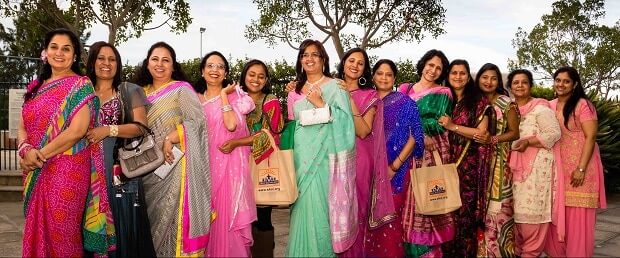Newly launched Ekal Women is committed to raising fund towards taking education to rural India

“If the poor children cannot come to the education, then the education must go to them” Swami Vivekananda
September saw the beginning of a new chapter in the history of Ekal Australia. Ekal Woman was launched with great fervour and enthusiasm by a small team of volunteers whose sole aim was to rally the women in Australia behind a very noble cause. The High Tea organised at the Mercure, Parramatta saw women all dressed in different hues of pink, ready to pitch in to make this humble effort a roaring success.
Sumathi Advani, Chairperson of UIA’s Women’s Steering Committee and Aishveryaa Nidhi, a prominent theatre personality who has carved a niche for herself in the field of Australian theatre, addressed the audience and shared their experiences.
The entertainment included songs by Shobha Ingleshwar, Bollywood dance potpourri by Neha Jain and a fun-filled Trivia. The afternoon showcased the Ekal cause with a short video and slideshow, highlighting the work done by Ekal Vidhalayas in remote tribal villages of India. The statics, though not overtly surprising, were staggering.
Most of the 300 million illiterate folk in India live in tribal villages that lack the basic amenities of life, like safe drinking water and basic healthcare. The literacy rate of the female population is as low as 39%, and only 10% of these villages have government schools. For families who survive on an annual income of $30, education for their children fades into oblivion. More hands on deck to increase their daily livelihood is the top priority. The existing schools are under-staffed with poorly paid teachers who are not motivated enough. Such villages are on Ekal’s road map.
The Ekal movement was started in India in 1986 by Rakesh Popli and his wife Rama Popli, with the intention of improving literacy at the grassroots level. The idea of the Ekal Vidyalaya, a single teacher school, caught the attention of the people and it soon became a global phenomenon, with Indian diasporas from across the globe sponsoring schools in remote regions of India. The best gift you can give any child is education, and that is what the Ekal movement endeavours to do.
Ekal Vidyalayas are different from traditional schools because the delivery of education is not regimented, but flexible. The schools are run free of cost when it is most convenient to their clientele, which would mean evening classes. This way, the parents have nothing to complain about. In fact, adults also participate in the educational experience. This education is not restricted to classroom learning, as the students are actively involved in the upliftment of the whole community. They learn about recycling and vermicompost; by selling the compost they prepare to local farmers, they generate income for the schools. The system the Ekal Vidyalayas put in place is a cyclic one, where every person in the village/community is benefitted and is a part of it, thereby taking ownership of it. They see purpose in the education meted out by the Vidyalayas.
Ekal Australia has been active since 2004 and has successfully earned sponsorships for 650 schools. Ekal Youth, which launched last year has so far raised $10,000 for school sponsorships. Ekal Woman Australia intends to raise funds by showcasing the talent of women in Australia, and also through individual or group sponsorships of schools. The September launch was just the first step in a long and meaningful journey ahead. They hope to welcome more women into the fold to help it expand. They want the women of Australia to join hands to make a difference in the lives of those in India, and add to the fabric of an educated and prosperous country. “Education is one of the most important means of empowering women with the knowledge, skills and self-confidence necessary to participate fully in the development process,” ICPD Programme of Action.
Empowering through education

Reading Time: 3 minutes




